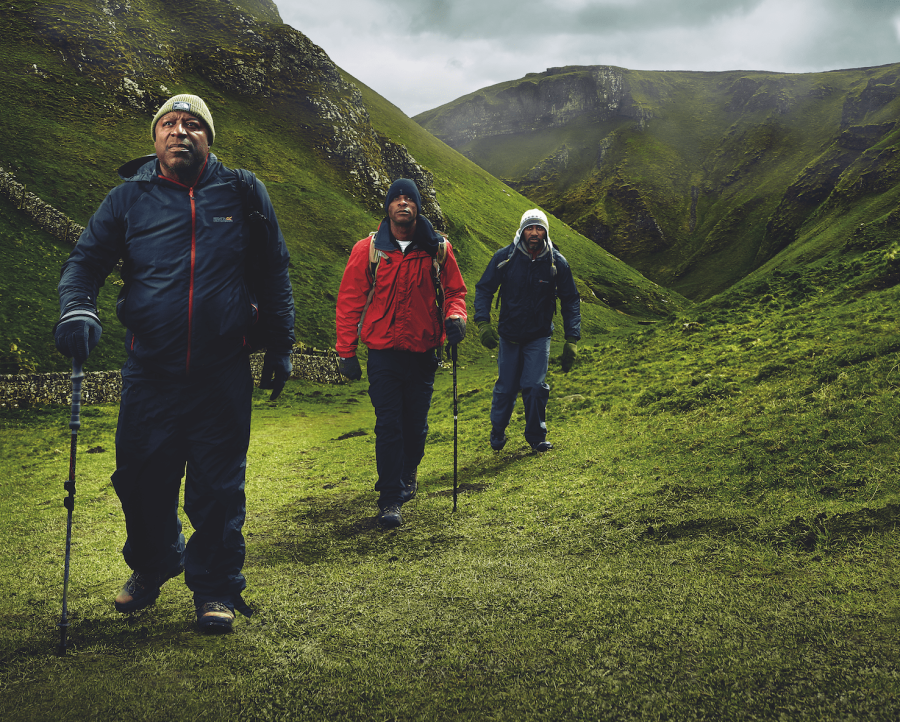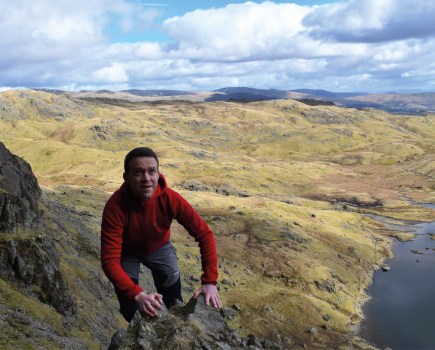Andrew Galloway reviews a play with an important message
Black Men Walking
Manchester Royal Exchange Theatre 24 January 2018
Written by Testament
Directed by Dawn Walton
“We walk. Though we are written into the landscape you don’t see us. We walked England before the English.”
Thus rings the claim, controversial in the view of certain tabloid newspapers, of a new production from Sheffield-based Eclipse Theatre Company (the principal Black-led touring company in Britain), which had its premier at the Manchester Royal Exchange Theatre on 18 January. Black Men Walking is the first of nine theatre plays to be commissioned by the production company as part of their Revolution Mix programme of events for 2018 that seeks to challenge inequality in theatre, television, radio and digital media.
To anyone with even a nominal experience of walking in the British hills, the narrative is remarkably familiar. A group of Sheffield men meet once a month to walk in the Peak District. As they themselves intone in rhythmic meter redolent of writer and musical director Testament, Yorkshire-based MC, rapper and human beatbox, “We walk for pleasure, we walk for fellowship, we walk to get away from tech, we walk to enjoy our beautiful country.” However, on this particular weekend the weather gods are not on their side. Whilst other members of the group have concluded that discretion is the better part of valour, elder member Thomas convinces Matthew and Richard that there is no cause for alarm and the three men head out from the Grindleford Station Cafe in search of the rocky outcrops high upon the moor. As they walk they discuss politics, football, their personal passions, whereby a bond of strength forms between them. All of which is very familiar to me from many years of the quintessential British walking group experience. The critical difference for these three men is an awareness of their need to process their experience through what Richard describes as a ‘double consciousness’: being both British and Black. This brings a juxtaposition of cultural idioms which is both humorous and challenging.
Lost upon the moor in zero visibility, the first flakes of snow swirling around them, the three men encounter a young woman named Ayeesha, a tai chi enthusiast who has similarly become disoriented. Her voice adds an angrier, Millennial perspective to issues of race and national identity which conflicts strongly with the more passive Thomas whose own story stretches back across 70 years to the docking of the MV Empire Windrush at Tilbury. Increasingly confused and disoriented, Thomas mistakes Ayeesha for the spirit of the Ivory Bangled Lady, identified by archaeologists in 1901 as being a socially important mixed-race woman from fourth-century AD Roman York. As Thomas’s condition deteriorates the four must work together to navigate the dangers of the mountain and the cultural perils of twenty-first-century Britain.
Skilfully blending contemporary Black music and poetry with traditional Yorkshire cultural tropes, the play is at turns engaging, humorous, challenging and profoundly moving. At a time when issues of race and national identity are once again at the forefront of British cultural and political change this new play enthusiastically delivers an important message about perceptions of race identity and how prejudice can ultimately be transcended by our shared humanity as experienced through common endeavour.
4.5/5
Black Men Walking will run until 3 February at the Manchester Royal Exchange Theatre and will then tour various locations throughout the country including the Belgrade Theatre Coventry, Northern Stage Newcastle, West Yorkshire Playhouse Leeds, and the Royal Court Theatre London.
For a full list of venues and dates see eclipsetheatre.org.uk #blackmenwalking








